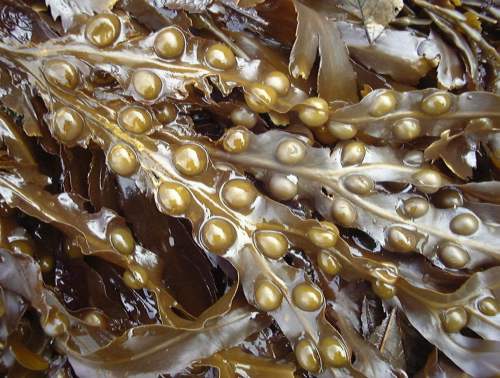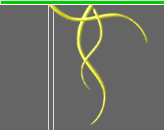| |
Bladderwrack (Fucus vesiculosus)
 |
Bladderwrack is a type of brown algae (seaweed) that grows on the northern Atlantic and Pacific coasts of the United States and on the northern Atlantic coast and Baltic coast of Europe. The main stem of bladderwrack, known as the thallus, is used medicinally. The thallus has tough, air-filled pods or bladders to help the algae float—thus the name bladderwrack. Although bladderwrack is sometimes called kelp, that name is not specific to this species and should be avoided.
Bladerwrack’s mucilaginous thallus has long been used to soothe irritated and inflamed tissues in the body. It was also historically used as a bulk-forming laxative. People living near oceans or seas have a historically low rate of hypothyroidism, due, in part, to ingestion of iodine-rich food, such as seafood and seaweeds like bladderwrack. It has also been used to counter obesity, possibly due to its reputation for stimulating the thyroid gland. Clinical research in this area has failed to confirm that seaweeds like bladderwrack help with weight loss, though more specific research is warranted.
Bladderwrack is high in Vitamin C, protein, beta-carotene, iodine, and phosphorus. This sea vegetable is very high in magnesium as well.
Contains many vitamins, minerals and essential amino acids - very detoxifying! Enriching, revitalizing and anti-inflammatory.
Bladderwrack may help heartburn. Bladderwrack may help atherosclerosis and strengthen immunity. Ruperez P et al at boiled Bladderwrack at different pHs. They found that the one boiled in acid showed the highest potential to be antioxidant. Bladderwrack consumption may reduce the risk of estrogen-related cancers. Bladderwrack extract might help hair restoring. Bladderwrack acts as a cleansing agent and skin mosturizer. Mineral-rich Bladderwrack nourishes the skin. When used in scrabs, masks or baths, it removes excess fluids from the skin, allowing for gentle detoxification of the body.
There are three major active constituents in bladderwrack: iodine, alginic acid, and fucoidan.
Bladderwrack contains about 0.1 per cent. of a volatile oil, cellulose, mucilage, mannite, colouring and bitter principles, soda and iodine, and bromine compounds of sodium and potassium.
Disclaimer: The information presented herein is intended for educational purposes only. These statements have not been evaluated by the FDA and are not intended to diagnose, cure, treat or prevent disease. Individual results may vary, and before using any supplements, it is always advisable to consult with your own health care provider.
|
|


















